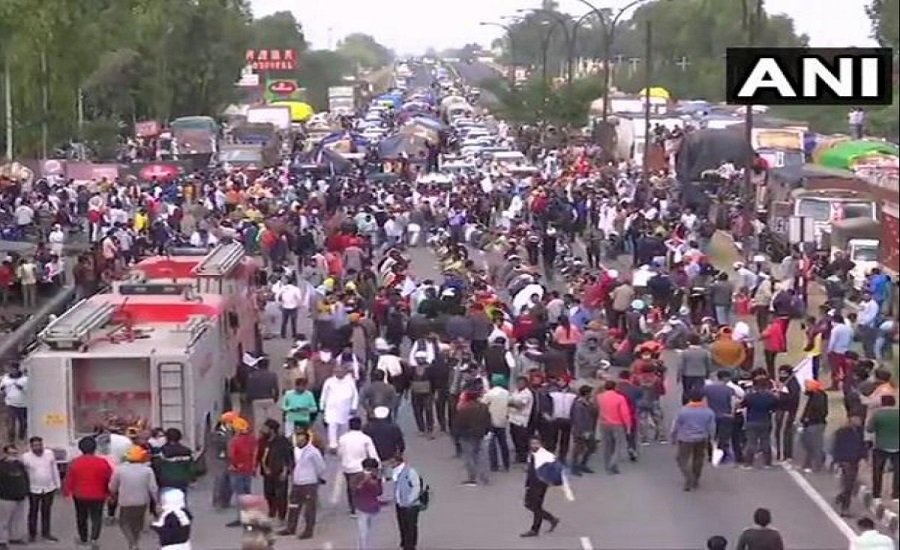
The agitators claim that they are protesting against the policies of the Centre as it is privatising all entities.
Clarion India
NEW DELHI — On Thursday, the first day of the two-day nationwide general strike, thousands of farmers and several trade unions protested against new farm Bills as well as labour laws. The sons of the soil are journeying to the national capital for the last leg of their two-day Delhi Chalo protest march on Friday.
Trade unions, students’ organisations, women collectives and farmers’ organisations staged protest demonstrations in various parts of the country, too.
The ryots, who have supported the trade unions’ general strike on Thursday, fear that the new farm laws will reduce their earnings and give more power to large retailers.
Farmers from six states–Uttar Pradesh, Haryana, Uttarakhand, Rajasthan, Kerala and Punjab–are protesting against the Centre’s three new farm laws aimed at bringing reforms by doing away with middlemen and improving farmers’ earnings by allowing them to sell their produce in the commercial market, anywhere in the country.
Hundreds of farmers led by Medha Patkar were prevented from entering Uttar Pradesh near the Saiyan village in Agra district close to the Rajasthan border.
Farmers on the borders of Haryana were also barred from entering New Delhi. Last night, the Haryana police used water cannons at least twice, in the freezing cold, to disperse protesting farmers and stop them from going to Delhi. But that failed to stop the protesters, who marched on, stopping at Karnal and Sonipat for the night. BJP-ruled Haryana has been using heavy force to try and block farmers making their way from Congress-ruled Punjab towards the capital in tractors and on foot for their two-day “Delhi Chalo” protest march.
The agitating farmers from Rajasthan and Madhya Pradesh were headed for Delhi to join the demonstrations in the national capital against the recent farm laws. The agitators have staged a sit-in (dharna) and Patkar has begun a 12-hour-long hunger strike. Talking to the media, Patkar said the laws were anti-farmers and anti-constitutional and should be withdrawn.
The nationwide strike by trade unions impacted other states, too. The supporters of the Rashtriya Janata Dal (RJD), the Congress and Left parties marched on the streets of Patna.
RJD joined the one-day ‘Bharat Bandh’ called by the trade unions as party workers blocked roads in Bihar’s Vaishali district. They even brought buffaloes and cattle to block the road and lit ‘diyas’, causing traffic jams on the Muzaffarpur-Hajipur road.
Patna DM Kumar Ravi said: “We have deployed adequate police force at strategic locations to avoid untoward incidents.”
The agitators claim that they are protesting against the policies of the Centre as it is privatising all entities.
“After Indian Railways, they are eyeing government-sector banks for privatisation. It is completely unacceptable. Hence we are on the streets,” said Sunil Mishra, a bank employee in Patna.
Bhai Virendra, RJD MLA from Maner, said, “The Governor was not given a futuristic vision to address unemployment, creation of jobs and curbing migration. Instead, he was mentioning achievements of Nitish Kumar’s earlier government.”
The nationwide trade union strike evoked a total response in South India as well. The shops, markets, offices across Kerala were closed while the main roads were also empty, barring a few private vehicles plying, as per the reports.
Vehicular traffic was partially affected in several places of Odisha. Members of various trade unions staged road blockades at different parts of the state, including Bhubaneswar, Cuttack, Rourkela, Berhampur, Rayagada, and Gunupur. They also picketed before several Central government offices.
The Odisha unit of the Congress party has extended its support to the strike.
“We are peacefully protesting against the anti-farm laws and labour laws of the BJP government at the Centre. We are trying to make the people aware about the laws that will hit them,” said Pradesh Congress Committee (PCC) president Niranjan Patnaik.
The protesters also demanded that the Centre withdraw anti-worker labour codes and privatisation of the public sector, including the financial sector.
In Delhi, several protesters have been detained for assembling. The police have detained SFI General Secretary Mayukh Biswas, JNUSU president Aishe Ghosh, LSR Students Union General Secretary Unnimaya and SFI Delhi President Sumit, among others.
In Tripura, the protesters were attacked by the BJP cadres and volunteers. State Secretary of SUCI (Communist), Arun Bhowmik told the Clarion India that BJP workers vandalised the office and assaulted their volunteers verbally and physically.
“The BJP goons, first vandalised the office of the Communist Party of India (CPI) and the Centre of Indian Trade Unions (CITU) and threatened people publicly against participating in the strike. In the end, they came to our party office, vandalised it and beat three of our volunteers”, Bhowmik added.
The centre has called the farmers for a second round of negotiations on December 3. The first round last month failed as both the Agriculture Minister and his deputy did not show up. The farmers then decided to make their point with the big protest march involving around 500 farmer organisations.

